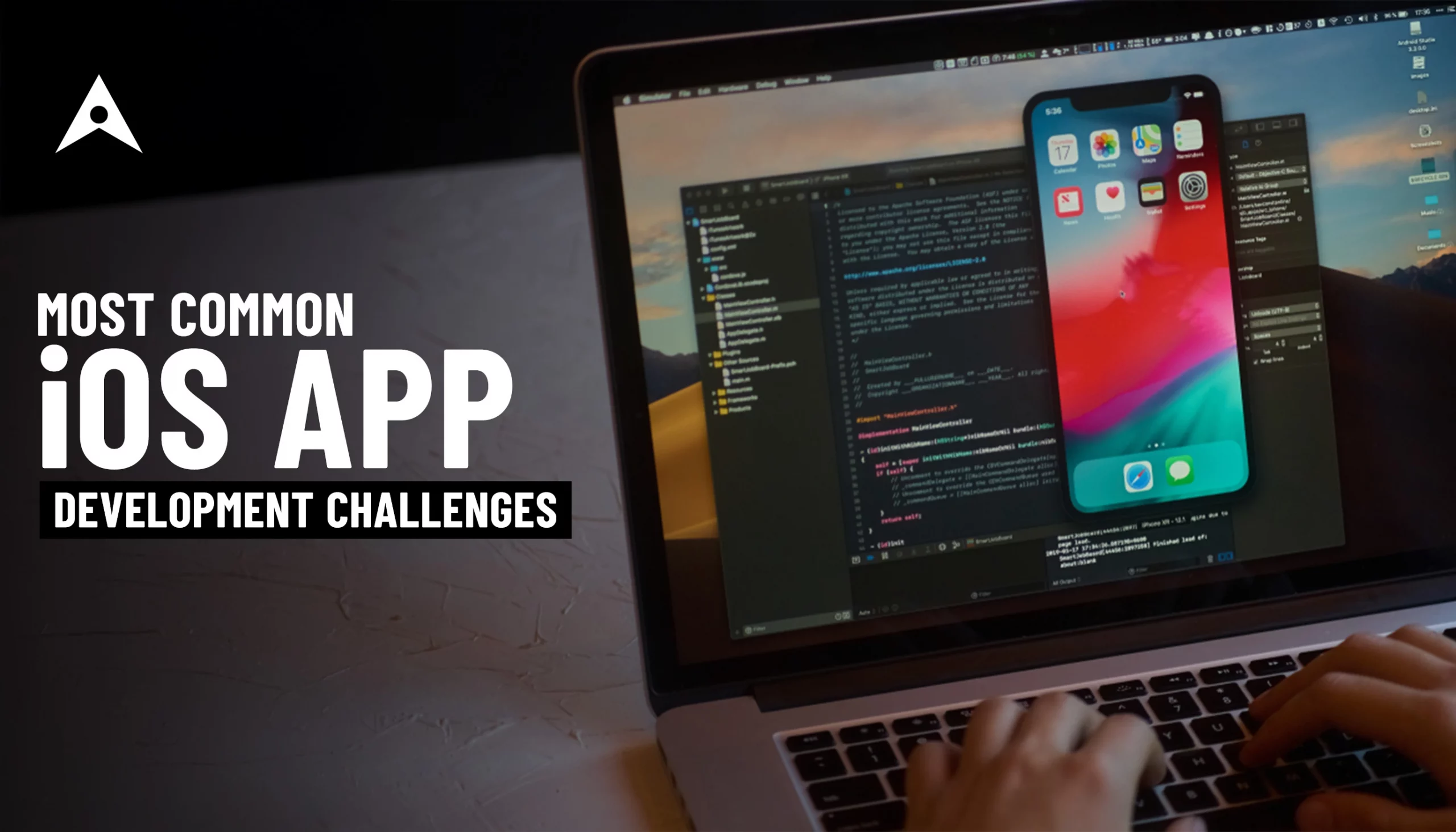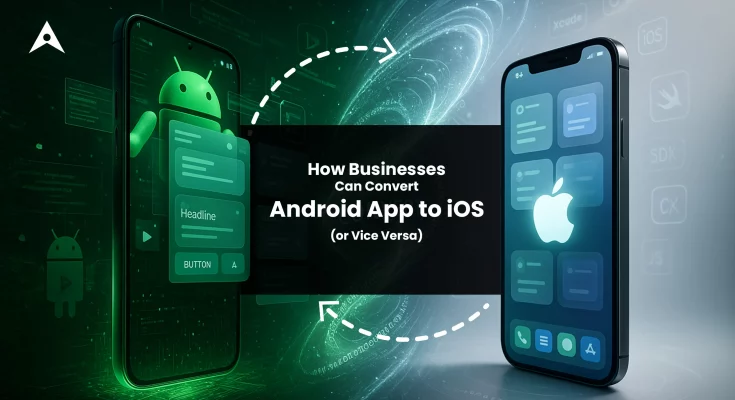In today’s mobile-first world, launching an iOS app sounds like a no-brainer for businesses which are aiming to expand their digital footprint. After all, Apple’s ecosystem is home to a highly engaged, premium user base, and the App Store can be a powerful channel to connect with them.
But behind the sleek, minimalist screens and seamless user experiences, iOS app development is anything but simple. Many business owners walk into the process with great ideas, only to find themselves caught off guard by hidden roadblocks—technical limitations, App Store rejections, performance glitches, or design complexities that don’t show up on the surface.
This blog breaks down the most frequent challenges business owners face when building iOS apps. If you are an entrepreneur looking to build an iOS app, you should be aware of the most common challenges that developers come across at the time of iOS App Development so that you can navigate them with confidence and avoid potential pitfalls.
Table of Contents
Why Understanding iOS Development Challenges Matters for Business Owners?
1. Because Your Business Goals Depend on the App’s Success
For many startups and established brands alike, an iOS app isn’t just a side project—it’s a core part of the business model. Whether it’s driving direct revenue, improving customer experience, or boosting brand visibility, your app plays a strategic role.
But when you’re unaware of the iOS development issues that can arise along the way, you’re more likely to underestimate timelines, budgets, or even technical feasibility. A lack of understanding often leads to decisions based on assumptions, not realities. Therefore, any disconnect due to this misunderstanding can be a costly one.
2. To Avoid Delays, Rejections, and Cost Overruns
Apple’s high standards for performance, security, and user experience are a double-edged sword. On one hand, they help maintain a quality ecosystem. On the other hand, they present a host of common iOS app problems that first-time app owners rarely anticipate. For instance, subtle UI inconsistencies can lead to deeper issues like poor memory management or API conflicts.
Understanding these early can help you ask the right questions, set realistic milestones, use the right iOS app development tools, and build flexibility into your development roadmap. It’s not about becoming an expert—it’s about being prepared.
3. Because the Development Landscape Is Constantly Evolving
From yearly iOS updates to new device types and screen dimensions, Apple doesn’t sit still—and neither does the developer community. If you’re not tuned into the challenges faced by iOS developers, you might unknowingly lock your app into outdated practices or incompatible technologies that affect future scalability. By staying aware of these challenges, you’ll be better equipped to adapt your product vision as technology shifts towards the future of iOS app development.
4. To Choose the Right iOS Development Partner from Day One
Remember that not all iOS developers are cut from the same cloth. Some center around rapid MVPs, whereas others prioritize projects such as design-heavy applications or more enterprise-grade builds.
When you understand the development challenges that exist, it becomes the next step to easily assess who will effectively work in collaboration with your vision. This gives you the knowledge to hire iOS app developers who hold the potential to foresee some roadblocks and address them beforehand.
5. To Protect Your Investment and Build Long-Term Value
An app isn’t a one-time cost—it’s a living product that evolves with user needs, technology, and your business itself. Choosing the wrong approach at the beginning can lead to performance bottlenecks, failed App Store reviews, or worse, customer churn. The best iOS app developers code not just for functionality but for the user experience, scalability, and longevity. Success between both parties relies more on how well you get to understand what they do.
7 Major iOS App Development Challenges
1. App’s Compatibility
Different Apple’s products such as iPhones, iPads, iPods, and MacBooks are available in the market and it mandatory that every developed iOS app is compatible with all the devices & Apple’s products. However, since Apple keeps releasing its new versions one by one, the more iOS developers are facing challenges in iOS app development.
If we compare Apple to Android, then the compatibility challenge is easy to solve in Apple. However, the roadmap for iOS app development is not as simple as it sounds.
So, in order to overcome this challenge, it must test an app by using the TaaS product to identify the issue. App owners or developers can avail of mobile application development services from a leading company to check out their app’s compatibility.
2. Challenges Come With Performance And Storage & Memory
Managing performance & memory limits are another iOS app development challenges that come in the way of iOS app developers. It especially occurs at the time when a developer manages the memory within an iPhone app, as the iPhone does not come with garbage collection. It causes the termination of the app if it becomes a source of control.
Since every device has its own memory restrictions, a single version of iOS faces problems in launching with the latest version. Thus, an iOS app developer or app owner should take into consideration the demand for the app.
3. Poor Network Connection
Network speed is such a big issue, the speed you are using might not be the same speed your end users are expecting from your end. The speed of the network can raise some concerns if you are incorporating videos & other streaming services that require a huge amount of data.
This raises challenges for the iOS app developers to develop the apps so that the developed app can match the user’s needs. However, the good news is that many of the companies, such as Netflix, have found a viable solution by adjusting the quality of video in order to reduce data usage.
4. App Store Approval
Get the first thing clear in mind before launching the iOS app to the App Store.. The App Store has some guidelines that your app has to follow before getting uploaded to the App Store. As the Apple store has some guidelines or rules, there are a number of reasons & it is important that one should be aware of them. Once you have developed an app, you are not allowed to publish it on the App Store instantly. You need to get approval from the App Store & try to avoid all the reasons for being rejected.
This will not only save the developer’s time but also help through different investment challenges. Therefore, it is advisable to work with a leading iOS app development company to ensure that your app will easily get approval on the App Store.
5. Battery Related Challenges
A major disappointing factor for many app users & iOS app developers is the app performance. The users are not satisfied with the performance of the app, which they have installed on their devices. The main reason is that these apps are battery-consuming apps, as it consumes a lot of battery power, which results in the app’s un-installation.
Therefore, it is advised for iOS app developers to develop the apps by using battery-saving features so that apps consume less battery & yield a better performance.
6. UI UX Designs
Most of the people are opting iOS devices due to its clean, intuitive design & excellent user experience. Therefore, once you are developing an iOS app, you have to keep your users in mind during the designing process. You can seek help from a well-recognized UI UX design agency to ensure unique and appealing design of your app. They have the expertise to make the design unique that will help you to lead the industry.
The UI only shows the core features & functionalities in a process flow, as developers can constrain the amount of space. It is the biggest challenge to managing the limited amount of screen space with a hike in business expectations from iOS apps
7. App’s Security
The major & important factor is the app’s security that should not be compromised while developing the iOS apps. In order to protect app’s data from the hackers, Proper Data encryption is must including factor in app development. It can be challenging for the developers to put a higher amount of security because the hackers can be so smart.
Pro Tips to Overcome These iOS App Development Challenges Effectively
1. Prioritize Planning Over Guesswork
One really eminent way to avoid the major iOS app development challenges is to plan for them. Plan as if things will go wrong without being too pessimistic; be as realistic as you can. Proceeding straight to implementing without a clear user-flow understanding, needing platform requirements of the application, and scalable architecture development is equivalent to building without a blueprint printed out. You need a map for the Apple guidelines, upcoming OS changes, and user expectations. The more granular your planning, the fewer surprises down the road.
2. Work With Developers Who Understand Business Context
All developers are different, and most of the time, it is not the technical solution that does it. You have the need for an entire team of iOS app developers who know Swift and Xcode as much as they know your business goals, user personas, and conversion funnels. When developers come into alignment with your business vision, they create features that are not just functional but are valuable. That means fewer rewrites, better UX, and faster go-to-market outcomes.
3. Leverage Prototyping and User Testing Early
Too often, businesses pour time and money into development—only to realize late in the process that the design doesn’t flow, or that users don’t “get” a certain feature. The fix? Build early prototypes and test them with real users or stakeholders. This helps you validate the concept, tweak the UX, and avoid costly pivots later on. This step is especially crucial for iPhone application development, where user experience expectations are incredibly high and even the smallest hiccup can impact your App Store ratings.
4. Don’t DIY Everything—Find the Right Tech Partners
All the stress inanimately mounting because iOS app development is perhaps not your thing. Going solo can overwhelm one easily-chiefly, financially. An iOS app development company, on the other hand, is less officious. Standardization, scalability, and processes have a say; they also work with Apple’s latest requirements—had you as a single-developer made an impression!
5. Think Beyond Launch—Plan for Post-Deployment Success
Launching the app is just one part of the process. The first version should be seen as a beta testing opportunity for getting user feedback, measuring how the app is performing, and executing all sorts of fixes. Post-launch improvements are hardly ever the focal point for many organizations since they feel the job is finished once the app is up on the App Store.
Conclusion
Every great digital product starts with an idea, but it only becomes successful when it survives reality. And the reality is, iOS app development isn’t as smooth as marketing brochures make it seem. There will be technical roadblocks, evolving Apple guidelines, UX nuances, and moments where you question everything from the design to the budget.
The good news? With a solid iOS app development team, you can easily overcome these challenges and deliver a flawless and market-ready product. And RipenApps is one such expert and reliable iOS app development company that can help you build a perfect iOS app without any hurdles.
FAQs
1. What are the common challenges in iOS app development?
Some of the most common challenges include managing App Store approval guidelines, ensuring compatibility across different Apple devices, dealing with frequent iOS updates, optimizing performance for limited device resources, and meeting high user expectations for UI/UX. Security, data privacy, and integration with third-party APIs also present recurring hurdles for developers.
2. What are the programming languages used in iOS application development?
The two primary programming languages are Swift and Objective-C. Swift is Apple’s modern, intuitive, and performance-oriented language, recommended for most new projects. Objective-C is older but still used in legacy apps. Developers may also use tools like SwiftUI for UI design and frameworks like Xcode and Cocoa Touch for building robust applications.
3. How can I ensure my app is compatible with all Apple devices?
To ensure compatibility, developers must adopt responsive design practices using Auto Layout in Xcode, test on multiple device simulators and real devices (iPhones, iPads, etc.), and support various screen resolutions and aspect ratios. Following Apple’s Human Interface Guidelines and staying updated with iOS SDK changes is also key to maintaining consistent performance across devices.
4. What are the best practices for UI/UX design in iOS apps?
iOS users expect simplicity, consistency, and elegance. Key practices include following Apple’s Human Interface Guidelines, using native UI elements for familiarity, keeping navigation intuitive, ensuring high touch responsiveness, optimizing loading times, and designing for accessibility. Design decisions should be driven by user feedback and tested early with prototypes.
5. How can I enhance the security of my iOS app?
Security starts with using HTTPS protocols, enabling App Transport Security (ATS), encrypting sensitive data, and avoiding hardcoded credentials. Leverage Keychain services for secure data storage, enable code obfuscation, and use Apple’s biometric authentication where applicable. Regular code reviews and security audits also help in identifying vulnerabilities early.











 India
India USA
USA Australia
Australia Canada
Canada UK
UK UAE
UAE
